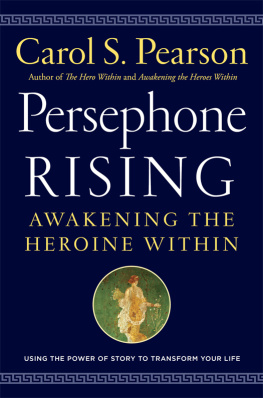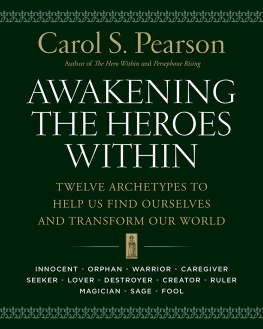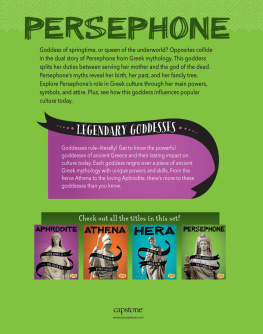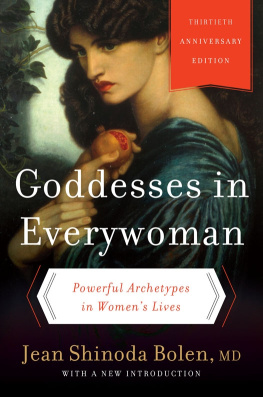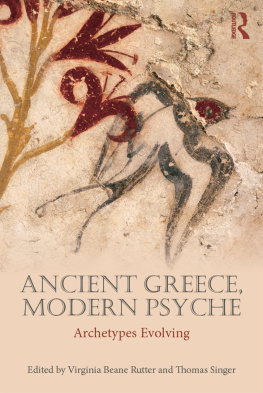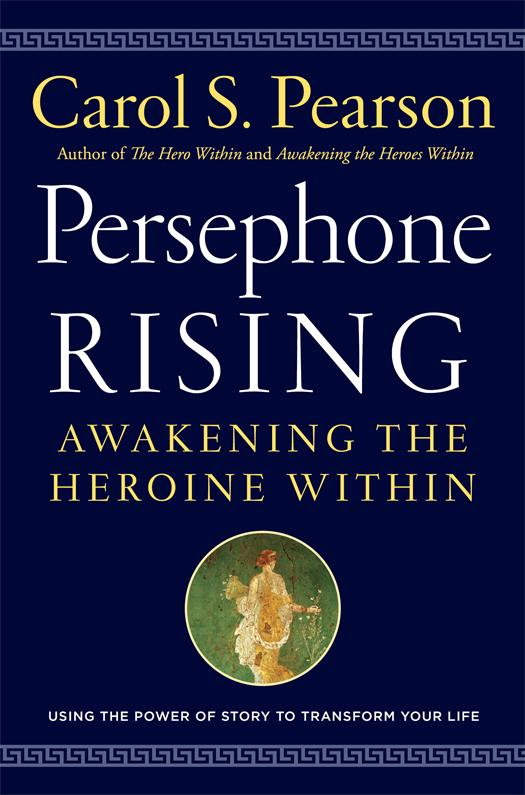L ONG AGO AND FAR AWAY, there was an island with an advanced civilization where art and beauty were primary, civility and peace reigned, and men and women lived as equals. But after many ages had passed, people from the nearby mainlandwhere men ruled and war and violence were commoncrossed the sea in their boats and invaded this island, defeating its people. Among the spoils of war they took home with them were some of the islands gods and goddesses.
These gods and goddesses retained knowledge of where they had come from and yearned to return, yet as time passed, their memories of the island and of life as they had once known it grew fainter and fainter. Finally, their recall of the island was like the ghostly writing in a palimpsest, just traces beneath the surface of newer inscriptions, as the deities became more and more what the new mortals they served wanted and understood.
Many ages later, one of these goddesses was luxuriating in the beauty of a verdant field. Her hair was golden, like corn silk, and she moved with the grace of grain blowing in a soft, warm wind. Her eyes were the color of a clear, sky-blue lake. While her body was voluptuous, she also seemed to emerge from the land, with the feel of someone solid and trustworthy. Her very name, Demeter, came from the Greek root word meaning the mother, and she embodied the compassion and nurturance this name implies.
From his throne high on Mount Olympus, Zeus, the god of all the gods, saw her. Zeus was as muscular as a bull and had the courage of a warrior. Clad from his head to his feet in armor, he inspired the respect of the other gods and terror in the hearts of his people, who knew they must worship him and make sacrifices to him or suffer the consequences. In his role as a sky god, he was knownwhen crossedto hurl down lightning bolts, bellow as loud as thunder, and create winds so strong that few could withstand their force.
But on this day, everything had gone his way, and he was feeling secure in his power and happy with his lot. Then he happened to spy Demeter and, filled with lust, he descended from on high to seduce her. Flattered by his attentions, Demeter enjoyed their lovemaking. After they had rested together contentedly, he explained, with some regret, that he had to return to his duties. After all, he was responsible for maintaining the social order of gods and mortals, as well as for quieting the anger of the Titans he had conquered, and soon he would marry the Titan beauty Hera, the goddess of marriage.
Zeus reminded himself that being the chief god, and consequently the king of all, meant that his responsibilities had to supersede his personal happiness, and that Demeter would be fine. Her satisfaction came less from sex or romance than from being a mother, and likely she would gain a child from this union. And he was right in this surmise.
Their resulting daughter was known as Kore, the maiden; it was not yet clear what she would be the goddess of, hence her generic name. She had hair as dark and luminous as the night sky, but a disposition so light and joyful that it seemed as if she had stars dancing as a halo around her. Her skin was honey golden, and her nature was similarly sweet. Her eyes were sea-foam green, the color of the Mediterranean, and those looking into them often felt a subtle call to adventure that caused them to yearn for something far away and as yet unknown.
Demeter loved her daughter more than anything or anyone, cherishing her and doing everything she could to keep her safe. But one day while Kore was off picking flowers in a meadow with her friends, Demeter left to take care of some business with other goddesses. She returned after a short time, only to learn that Kore was nowhere to be found. Her playmates told Demeter that Kore had wandered off and had not been seen since. Demeter asked everyone in the vicinity if they had seen Kore or knew where she was, but no one would admit to any knowledge of what had happened. Distraught and worried, as any parent would be, Demeter feared that Kore had been killed, raped, or kidnapped. For days, Demeter did not sleep or eat or bathe as she searched frantically for Kore, following ever-widening paths that led her further and further from home.
Finally, Demeter encountered Hekate, the goddess of the crossroads, who was known for the depth of her wisdom, which was especially relevant in times of choice or when someone was at a loss for where to go or what to do. A very ancient goddess, Hekate was one of the few who (along with the Fates) appeared to other gods and to humans in the guise of an old woman. Closely associated with the moon and its phases, she saw better at night, like an owl or a cat. Her hearing, however, was always acute, even catching whispered secrets that traveled to her in the wind. When Hekate recognized the depth of Demeters maternal grief, her own heart was touched, and she told Demeter that she had heard Kore cry out, and she believed that Kore might have been abducted.
Hekate suggested that she and Demeter visit Apollo, the blazing sun god, who, from his position in the sky, may have seen what transpired. Gratefully, Demeter accompanied Hekate up into the sky to see Apollo. Now, Apollo was a favored son of Zeus, and often served as his emissary. He dutifully explained to Demeter that she need not worry. Kore had become the wife of a prestigious god, Hades, who ruled one of the three major realms of the world. Of course, Demeter well knew that Zeus ruled the sky and the surface of the earth; Poseidon, the seas; and Hades, the Underworld, where the dead reside. But she listened politely, so as not to offend. Apollo went on to assure her that all was well: Hades had asked Zeus for Kores hand in marriage, and after all, Zeus was her father and had the right to decide whom she married.
Hades was a dark and handsome god, rich beyond measure, with a mischievous turn of his lips that women adored. He had loved Kore since he first saw her, but had repressed his growing desire until she was pubescent, and thus of age. When Hades appeared before Zeus, he was lit with passion and trembling with eagerness to hold his beloved. Zeus thought it better to have Hades marry Kore than ravish her unwed, as he feared might happen given what he was seeing. If that were not enough, Zeus knew that Hades had always resented how he, Hadess younger brother, had become chief of the gods, supplanting his older sibling. Zeus had to manage Hades carefully so that he would not stage a rebellion. So all in all, Apollo continued, it was a wise decision for Zeus to bless the marriage then and there.
So when was this marriage ceremony? Hekate asked, a bit provocatively, since all the gods should have been invited. Ignoring that question, Apollo explained that Hades had convinced Aphrodite of the depth of his love for Kore and asked her to help him woo her. Aphrodite placed the most beautiful flower anyone had ever seen near the meadow where Kore was playing with her friends. Kore saw this flower in the distance and became so entranced by it that she wandered away from them. She bent over to pick it but found that she had to pull it hard, and when she did so, the earth opened up, and Hades, on his chariot, bounded out of the depths, swept her up in his arms, and carried her back to his underworld kingdom.
Learning this, Demeter feared that, though Kore was alive, she would be scared, upset, even traumatized. Certainly, she was unprepared for sex, especially with someone she did not yet know and who had violated her sovereignty by roughly carrying her off against her will. Kore was a young girl, after all, still really a child, although her body was becoming more womanly. As Demeter ruminated further about this, her worry was matched by her anger at Hades, but even more so at Zeus, who should have protected his innocent young daughter. She did not mind that he had been no help in raising Kore, but for Zeus simply to dispose of her for political expediency and personal advantage was beyond what she could accept.

